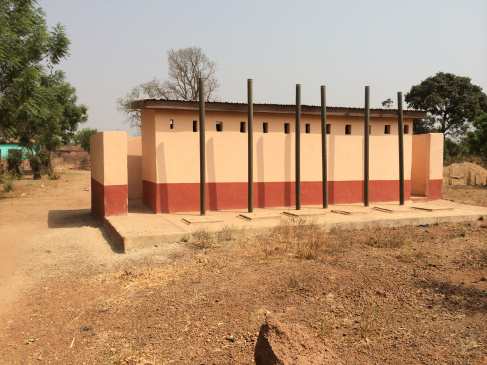The Kpandai Poly Clinic for the past two years has recorded drastic reduction in diarrhea cases.
The clinic recorded 110 cases of diarrhea monthly in 2018 but for the past two years, cases of diarrhea are near extinction.
This follows the implementation of the Community-Led Total Sanitation program. Out of the 245 communities in the Kpandai district, 190 communities have been declared free of open defecation.
More than half the world's population does not have access to a safe toilet.
In Ghana, only one in every five households has an improved sanitation facility, which means a majority defecate in the open.
Open defecation has serious negative health effects on the populace, especially children. Over 3,600 children die yearly in Ghana from diarrhea yet open defecation is practice like no one’s business.
The situation is more serious when you head up north. It is estimated that about half of the population practices open defecation in the Northern Region.
But in the midst of this gloom, some districts are making huge impact in eradicating open defecation.
The Kpandai District is one of such districts with more people saving and sourcing for loans to build toilets facilities.
The Kpandai District is one of the beneficiaries of the UNICEF WASH programme funded by Global Affairs Canada (GAC). With several interventions over time, the district has made giant gains in sanitation.
A District Sanitation Fund (DSF) established in the district in 2019 is to help people source for loans to construct improved latrines.
UNICEF provided a seed fund of USD 20,000 per district to start the DSF in some selected districts and is offered through six Financial Service Providers.
Over 70 households have taken loans to complete and use - their household latrines.
30 trained artisans have been trained to support the construction of resilient latrine to ensure the gains made are sustained whiles 210 community technical volunteers have been trained to support rural communities especially to construct durable toilets.
As the world celebrates 'World Toilet Day' we focus on two communities: Tikarini and Kwatape in the Kpandai District where they have begun reaping the benefits of building toilets in their homes.
A resident, Belinda Njemaway said snake and scorpion bites used to be a daily occurrence but has stopped now because they have latrines at home.
“Wild animals like snake and scorpions used to bite us in the bush. Sometimes, in the processes of defecating, we could have men walk in on us,” she said.
Another resident of Kwatape, Niyakasama Diana said she and her family haven’t been to the hospital in a long time since they built a latrine at home.
"The illnesses that previously worry us does not happen any longer” an excited Diana narrated.
Jacob Lapas’ story was no different. He said children wash their hands once they attend to nature’s call which was not the case in the past.
“Flies from feaces do not come perch on our cooking utensils anymore, so sickness is a thing of the past.
It is therefore not surprising that Kpandai is the second in the league of open defecation free districts in the Northern Region.
Latest Stories
-
“We need a dedicated Forest Ranger Force,” says Fritz Baffour
5 minutes -
AG did no wrong in briefing the public about Adu-Boahene’s case – Benjamin Quarshie
10 minutes -
We’re committed to resolving high-profile murder cases – Mahama
16 minutes -
PNP condemns Mahama for entertaining moves to remove Chief Justice
29 minutes -
Dr. Anima Wiafe Akenteng highlights the importance of traditional marriage
41 minutes -
Esther Cobbah, Georgina Fiagbenu, Emma Wenani made it on Women in PR Ghana’s 2024 Top 10 PR list
59 minutes -
Jacqueline Parditey: Accelerating action to end cyberbullying
1 hour -
Celestine Donkor teams up with Diana Hamilton for new project
1 hour -
Unravelling data behind 2025 TGMA nominations
1 hour -
The Bank Square: Loot or testament of excellence?
2 hours -
NPP MP files suit against Attorney-General over Chief Justice removal process
2 hours -
Appolonia City delegation calls on Ghana High Commission in UK
2 hours -
Appolonia City to participate in Black History Festival 2025 in Atlanta
2 hours -
Strengthening the rule of law: The need for bold and inclusive judicial reforms (II)
2 hours -
KSM returns this Easter with a spectacular comedy and luxury experience at Kempinski
2 hours

